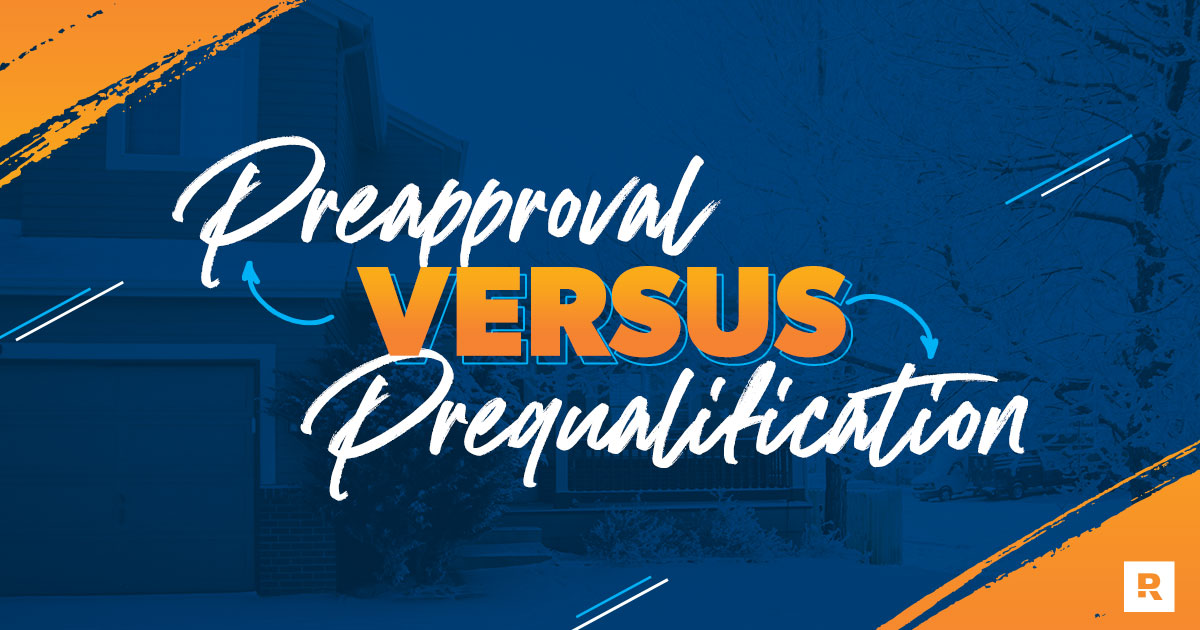Mortgage Preapproval vs. Prequalification: What's the Difference?
9 Min Read | Sep 18, 2023

When you’re buying a home, you do everything you can to stand out from your competition. OK, maybe you tried but you can’t be the Hercules of homebuyers and pay 100% cash for a house. But you can flex your muscles by getting prequalified or preapproved.
But hold up a second. Why the heck are there two "pre" mortgages? Do you need both or just one? Let’s look at them side by side and find out.
What is a mortgage prequalification?
A mortgage prequalification is a quick estimate of how much home you can probably afford. (At least according to the lender—your actual home budget should be a separate conversation.)
Why is it a quick estimate? Because, honestly, you don’t need to do much to get one. All you need is your name, phone number, and some numbers (real or fake) that show your income, assets and debts. Give these to your lender over the phone, online or in person—and they’ll give you a prequalification on the spot.
When is the best time to get a mortgage prequalification?
First, decide if you’re ready to buy a home. If you are, get prequalified.
Yeah, it’s really that simple. Since a prequalification gives you a big picture idea of how much mortgage you would be approved for, the best time to get one is in the very beginning—when you’re reviewing your budget. Think of it as the first step in the mortgage process.
What do you need to get a mortgage prequalification?
Here’s the truth—you need a lender and that’s about it. As long as you have numbers in your head or on paper, you can get prequalified.
What is a mortgage preapproval?
A mortgage preapproval is a step above a prequalification. It’s a thorough investigation of your income, assets, credit history, rental history and debts. It will give you a concrete idea of how much home you can afford—according to your lender. When you get preapproved, a lender verifies you’re employed, checks that you aren’t falsifying the facts, and makes sure you aren’t swimming in debt up to your eyeballs.
When is the best time to get a mortgage preapproval?
The same as with mortgage prequalification, the best time to get a mortgage preapproval is when you’re ready to start shopping for a house. In fact, we’re going to let you in on a little secret—you can skip prequalification and go straight for preapproval.
When you receive your preapproval, keep one important fact in mind: Your lender will likely approve you for way more money than you should consider spending on a home. Stick with these two guidelines and you’ll have a home you can truly afford, while you work toward bigger financial goals like saving for retirement or paying for your kids’ college:
- As we mentioned above, you need to put at least 10% down (20% will help you avoid paying that pesky PMI). So if you have $20,000 saved, you can afford the down payment on a $200,000 home.
- Your payments on a 15-year mortgage should be no more than 25% of your take-home pay. You’ll pay thousands less in interest with a 15-year mortgage than you would with a 30-year mortgage—and you’ll be out of debt in half the time!
You’ll be tempted to look at more expensive homes, especially when you see how much your lender thinks you can afford. But a huge mortgage payment will ultimately make your home a curse, not the blessing it should be.
What do you need to get a mortgage preapproval?
Remember how easy it was to get prequalified? You didn’t have to do anything, right? Well, get ready. To get preapproved, you have to give your lender a lot of documents, including all of the following:
Proof of Income and Employment
- Paystubs from the last 30 days
- W-2s from the last two years
- Personal federal tax returns from the last two years (include all tax tables and schedules)
Plus more if any of these apply to you:
- Freelance or business tax returns from the last two years (include all tables and schedules)
- If retired, your benefit reward letter, your last two years of 1099 forms and tax returns
Proof of Assets
- Bank statements from the last two months of all your accounts: checking, savings, Roth IRA, 401(k) and stocks. The statements must show your name, account number and the name of your bank.
- If someone in your family is helping you pay for the house, a gift letter signed and dated by the person helping you.
Proof of Identification
- A copy of your driver’s license
- Your social security number or card
Credit Score
- Your lender will check your credit. They’ll do this on their own, so you won’t have to submit anything. (No credit score? Read more here.)
How long does it take to get a mortgage preapproval?
As long as you have all your documents ready, you can get a mortgage preapproval on the same day you visit your lender. But if you have lots of debt and a low credit score, it can delay the process—anywhere from a few days to several months.
Do preapprovals expire?
Yes. Because you could lose your job, take on new debt, or experience other financial hazards. Your preapproval would then no longer reflect your financial life. Mortgage preapprovals typically expire after 60 to 90 days.
With the right agent, taking on the housing market can be easy.
Whether you’re buying or refinancing, you can trust Churchill Mortgage to help you choose the best mortgage with a locked-in rate.
How are prequalifications and preapprovals similar?
By now, you’ve probably noticed these terms don’t mean the same thing. But before we get deep into the differences, let’s pause a second and talk about what they have in common.
1. Neither one guarantees a mortgage.
You could have both a prequalification and a preapproval and still be denied a mortgage! Your loan application must go through a mortgage underwriter, which is the last step in the mortgage process, to get the final green light.
2. Both serve to help you understand how much mortgage the lender will allow.
Knowing specific details about mortgage limits early on in the process will help you save time in your home search. You don’t want to find the perfect home only to discover its way out of your price range!
3. Both don’t require you to get a mortgage from the lender who prequalified or preapproved you.
Although it would be easier for you to stick with the same lender—since you wouldn’t have to submit documents twice—you can always switch lenders later.
How are prequalifications and preapprovals different?
Even though these terms share some similarities (and sound almost identical), they are not interchangeable. In fact, they have three major differences.
1. Prequalifications give you an estimate of what you can borrow. Preapprovals tell you what you can actually borrow.
A preapproval states the specific loan amount that you’re eligible for. It’s not an estimate. Sure, you can "guess-timate" and get prequalified, but the evidence has to be there for preapproval.
2. A preapproval requires thorough documentation. A prequalification does not.
A lender will take your word for prequalification. But to be preapproved, you need to prove that your numbers are accurate and up-to-date.
3. A preapproval requires a credit history check.
In addition to the mountain of documents you provide, a lender will run a credit check to see how well you’ve handled debt in the past.
Why preapprovals are stronger than prequalifications
So here’s the scoop: A mortgage prequalification is a first step to getting a mortgage—one that gives you a rough idea of how much you can borrow. Since the prequalification process is quick and easy, it can help you get the ball rolling, gain some momentum, and start working with a lender.
Dave Ramsey recommends one mortgage company. This one!
You get preapproved when you know you’re ready to buy a house. In fact, if you want any credibility as a homebuyer, you need at least a preapproval. Home sellers know how easy it is to get a prequalification—that’s why they don’t hold much weight.
On the other hand, when you’re preapproved home sellers take you seriously. They know you want a house so bad that you’re willing to go through the excruciating paperwork process of getting preapproved. You’re either totally nuts—or confident you can buy a house.
What is a certified homebuyer?
Most people stop at this point. They go out to a reputable lender, get a mortgage preapproval, and start shopping. But what most buyers don’t know is that there’s a third option—one that goes a step beyond a preapproval.
But what most buyers don’t know is that there’s a third option—one that goes a step beyond a preapproval.
It’s called certified homebuyer.
It’s called certified homebuyer.
A certified homebuyer has all the advantages of a mortgage preapproval: A loan specialist looks at your financial history and credit score and informs you on how much mortgage you are approved for.
The difference between a preapproval and certified homebuyer is the underwriting. After a loan specialist preapproves you, they go a step further and submit your loan application to a mortgage underwriter. It’s a long step that often happens at the end of the mortgage process. Think of the mortgage underwriter as the lender’s detective. If there’s an error on your loan application or a question about your ability to repay debt, they’ll find out.
Yeah, they’re really detail-orientated, which is why mortgage underwriting can sometimes take three weeks. Imagine trying to close on a house, and you have to wait nearly a month for the mortgage underwriter to give you the go (or the no). It’s a terrifying thought, isn’t it?
Why a certified homebuyer is stronger than a mortgage preapproval
If you want to stand out as a homebuyer, getting certified will help you in two big ways.
1. You’ll be one step closer to getting a mortgage.
Going through the underwriting in the beginning helps catch any errors early on and prevents issues from popping up at the last minute. That way you won’t have to go through the dreadful wait at the end of the mortgage process when trying to close on your dream home.
2. You’ll increase your chances of having your offer selected.
With a certified homebuyer, home sellers will be more confident in you as a buyer. And if there’s a multiple-offer situation, home sellers will be more likely choose you over a buyer that’s only preapproved.
How do you become a certified homebuyer?
Right now, Churchill Mortgage is the only lender that provides this unique opportunity. Don’t sell yourself short in the home-buying process with a standard preapproval. And make sure you’re working with a top-notch real estate agent—who is familiar with your local area—to help you in your house search.
Take your credentials to the next level today and get in touch with a Churchill Mortgage expert!


